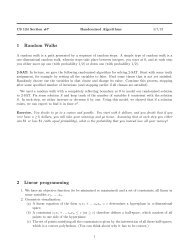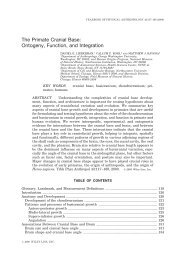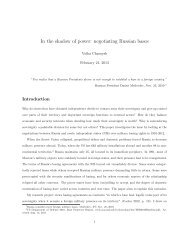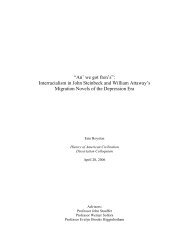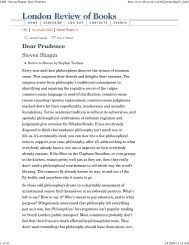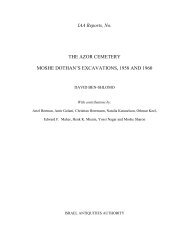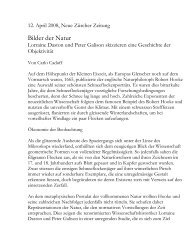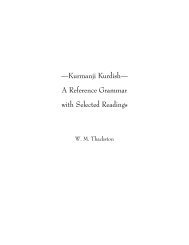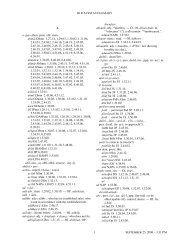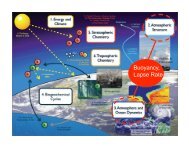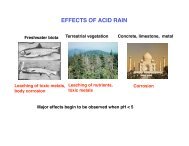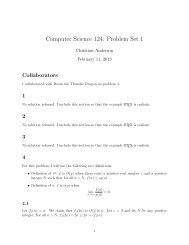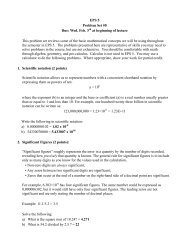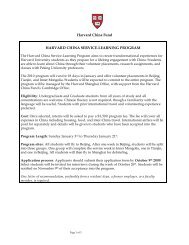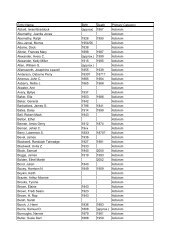- Page 1:
—Kurmanji Kurdish— A Reference
- Page 4 and 5:
THE VERB § 11. Present Copulas....
- Page 6 and 7:
Mahmut Baksî, “Çar Aliyê Me Ag
- Page 8 and 9:
KURMANJI KURDISH sively influenced
- Page 10 and 11:
KURMANJI KURDISH today, are provide
- Page 12 and 13: vEk] ‘a man’ and díçe [»dItS
- Page 14 and 15: y is the ‘y’ of English ‘yes
- Page 16 and 17: KURMANJI KURDISH writing of the fur
- Page 18 and 19: plural is identical to the nominati
- Page 21: SUBSTANTIVES nine indefinite nouns
- Page 26 and 27: zimanekî min yê taybetî a specia
- Page 29 and 30: kitêbeke nû ya min a new book of
- Page 31 and 32: ji … ve from; as of, since ji bil
- Page 33 and 34: 8,000 heşt hezar 9,000 neh hezar 1
- Page 35 and 36: formed from the cardinal numbers pl
- Page 37 and 38: struct cases, as in şem (nom.) but
- Page 39 and 40: Cumhûriyeta Mehabadê di dîroka K
- Page 41 and 42: Né báş e. It is not good. Ev xan
- Page 43 and 44: ojname xwendin ‘to read newspaper
- Page 45 and 46: There are also two verbs, zanîn
- Page 47 and 48: Em behsa beşê kurdên Kurdistana
- Page 49 and 50: congujated based on the stem ç- wi
- Page 51 and 52: (6) in all purpose clauses, usually
- Page 53 and 54: Ya meriv ê israr bike û bi kurdî
- Page 55 and 56: her- respectively. hatin wer- were
- Page 57: present, as in the following: Kaset
- Page 60 and 61: If any one in a series of co-ordina
- Page 64 and 65: Examples reflect changing agents (
- Page 66 and 67: tu hatibûyî hun hatibûn tu çûb
- Page 68 and 69: see §33. Çavên Nazê nedikaribû
- Page 70 and 71: elative clauses with an antecedent
- Page 72 and 73: CONSONANT-FINAL STEM VOWEL-FINAL ST
- Page 74 and 75: tu bíhatibûya hun bíhatibûna te
- Page 76 and 77: Te dixwest jinek porzer û laş sp
- Page 78 and 79: tu hatiye dîtin hun hatine dîtin
- Page 81 and 82: Ew di wir de dide xuya kirin, ku ku
- Page 83 and 84: Beriya ku em dest bi dersên xwe bi
- Page 85 and 86: Tirs herku çû bêtir bû û tamar
- Page 87 and 88: As in English, there is an occasion
- Page 89 and 90: Wî hîs kir ku tenê ye. He felt h
- Page 91 and 92: READINGS IN KURMANJI QEDRÎCAN [Qed
- Page 93 and 94: KURMANJI KURDISH em ji hev wenda b
- Page 95 and 96: dibijart û destê xwe bi aheng kil
- Page 97 and 98: KURMANJI KURDISH Çar Leheng: Lehen
- Page 99 and 100: KURMANJI KURDISH Mêraniya Ferzende
- Page 101 and 102: germa dijwar laşê te sist kiribû
- Page 103 and 104: KURMANJI KURDISH Rojhilata Navîn
- Page 105 and 106: KURMANJI KURDISH Wê rojê dîtina
- Page 107 and 108: Vegera Mal “Yadê, bavo ê kengê
- Page 109 and 110: KURMANJI KURDISH Mam Reşîd satila
- Page 111 and 112: KURMANJI KURDISH Ev bûbûn nêzîk
- Page 113 and 114:
KURMANJI KURDISH sor u zer li pişt
- Page 115 and 116:
KURMANJI KURDISH ku ji Sovyetê tê
- Page 117 and 118:
KURMANJI KURDISH hikûmetê, perçe
- Page 119 and 120:
KURMANJI KURDISH Bi xişxiş û ç
- Page 121 and 122:
çavê min daket. 1 Lê navê kêzi
- Page 123 and 124:
—Niha jî ez vê pirtûka han wer
- Page 125 and 126:
cigarek vêxist. Wilo xuya bû ku w
- Page 127 and 128:
KURMANJI KURDISH torên ku xwestine
- Page 129 and 130:
KURMANJI KURDISH yek ji endamên w
- Page 131 and 132:
KURMANJI KURDISH saliya Cumhûriyet
- Page 133 and 134:
KURMANJI KURDISH Piraniya wê li na
- Page 135 and 136:
kan mecbûrî wergêran bikin, hem
- Page 137 and 138:
KURMANJI KURDISH *** Piştî çend
- Page 139 and 140:
Ezman girtî bû; bandevekê ji re
- Page 141 and 142:
hej kuştin û hilanîna tola xwe n
- Page 143 and 144:
KURMANJI KURDISH ketim imtihana dib
- Page 145 and 146:
nava gund û teyan û zolilkên dor
- Page 147 and 148:
Bi rastî heger ez ne çiyayî bûm
- Page 149 and 150:
dixwest çîroka li ber dilê min
- Page 151 and 152:
qediyabû. Dadê kincên xwe li xwe
- Page 153 and 154:
KURMANJI KURDISH —Çawa nayê bî
- Page 155 and 156:
KURMANJI KURDISH zaf zaf ne ji me
- Page 157 and 158:
HESENÊ METÊ Labîrenta Cinan 1
- Page 159 and 160:
ûne êdî. Mîna ku sofî Sêvdîn
- Page 161 and 162:
KURMANJI KURDISH malbata wî hinek
- Page 163 and 164:
мәзьн у гьрингьн. KUR
- Page 165 and 166:
KURMANJI KURDISH к’ӧрда-ә
- Page 167 and 168:
KURMANJI KURDISH политикие
- Page 169 and 170:
KURMANJI KURDISH мһащьра б
- Page 171 and 172:
Р’зго-Сеп’о Р’зга
- Page 173 and 174:
бу чаwа ч’йа. Щар-ща
- Page 175 and 176:
у бәре хwә дьда чоле
- Page 177 and 178:
—Һь wә дит?—Т’атос
- Page 179 and 180:
KURMANJI KURDISH ӧлма у Мәр
- Page 181 and 182:
ﻮـ# ﻪــ ﻨﻫ ﻪـﻣ ﰏ
- Page 183 and 184:
ﻪـﻛو ىرﺎـﺴ/ﭭﻧ ــ
- Page 185 and 186:
ﲔـــ ﺘ(ﺳار ﻰـﭬوﺮ
- Page 187 and 188:
ىkـﳕ ﺎـﻣد . ﻮـﺮﺑ
- Page 189 and 190:
ﻰ© ـﭘ êـr . نﻮـﺑد ت
- Page 191 and 192:
ﲑــﺑ ،نﺎــﻴ ــــ
- Page 193 and 194:
Eــ .ﭬﺎـﻫ ﺎـﭬü رﻪ
- Page 195 and 196:
ﯚــﮐﻪــﯚﺗ ــﮐﻪ
- Page 197 and 198:
9ﺎـﻣرﻪـﺳ و> ـﺳ و و
- Page 199 and 200:
ﱙﻩﺮــ ?ﻓ یﺪــ Cﺋ
- Page 201 and 202:
یو ب رﻪــﺑ ﻪــﻧﰷ
- Page 203 and 204:
KURDISH-ENGLISH VOCABULARY ready am
- Page 205 and 206:
KURDISH-ENGLISH VOCABULARY belekî
- Page 207 and 208:
KURDISH-ENGLISH VOCABULARY bêj-
- Page 209 and 210:
KURDISH-ENGLISH VOCABULARY (time) p
- Page 211 and 212:
KURDISH-ENGLISH VOCABULARY repair,
- Page 213 and 214:
KURDISH-ENGLISH VOCABULARY here; li
- Page 215 and 216:
KURDISH-ENGLISH VOCABULARY dilovani
- Page 217 and 218:
KURDISH-ENGLISH VOCABULARY esil m o
- Page 219 and 220:
KURDISH-ENGLISH VOCABULARY sometime
- Page 221 and 222:
guvahî f testimony guvaştin (dial
- Page 223 and 224:
KURDISH-ENGLISH VOCABULARY hewale m
- Page 225 and 226:
KURDISH-ENGLISH VOCABULARY hov wild
- Page 227 and 228:
KURDISH-ENGLISH VOCABULARY kef 2 f
- Page 229 and 230:
KURDISH-ENGLISH VOCABULARY kufuk m
- Page 231 and 232:
KURDISH-ENGLISH VOCABULARY tive que
- Page 233 and 234:
KURDISH-ENGLISH VOCABULARY mikan =
- Page 235 and 236:
KURDISH-ENGLISH VOCABULARY nihe = n
- Page 237 and 238:
KURDISH-ENGLISH VOCABULARY perpitî
- Page 239 and 240:
KURDISH-ENGLISH VOCABULARY ephone,
- Page 241 and 242:
KURDISH-ENGLISH VOCABULARY qurm m t
- Page 243 and 244:
KURDISH-ENGLISH VOCABULARY ronakbî
- Page 245 and 246:
KURDISH-ENGLISH VOCABULARY sir f co
- Page 247 and 248:
KURDISH-ENGLISH VOCABULARY oneself
- Page 249 and 250:
KURDISH-ENGLISH VOCABULARY ly; bi ~
- Page 251 and 252:
KURDISH-ENGLISH VOCABULARY after th
- Page 253 and 254:
KURDISH-ENGLISH VOCABULARY xewlî f
- Page 255 and 256:
KURDISH-ENGLISH VOCABULARY siyaset



